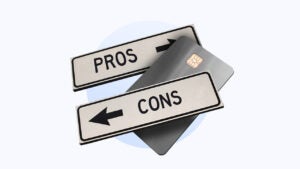Medical credit cards: How they work, risks and alternatives




Key takeaways
- Medical credit cards can help you finance expensive medical procedures, but they often come with high interest rates and unnecessary fees.
- Unlike traditional cards with 0 percent interest promotional offers, medical credit cards can come with “deferred interest” that can leave you paying retroactive interest on your bill if you fall behind on payments.
- The most common medical credit card comes from CareCredit, a platform that facilitates financing for medical and dental care.
- Before applying for a medical credit card, call your medical provider to discuss financial aid — including “charity care.” You can also consider alternatives like personal loans or traditional credit cards with lower interest rates.
Medical credit cards are a type of credit card you can use to cover unexpected and potentially expensive medical and dental bills. If you find yourself needing an emergency root canal or you’re facing another medical procedure you haven’t been planning for, medical credit cards can help you foot the bill.
Like other credit cards, users pay back the money they charge to medical credit cards through regular monthly payments. Unfortunately, interest rates and fees for these cards can be higher than you’ll find with traditional cards from issuers such as Bank of America, Capital One and Chase.
Medical credit cards can also come with deferred interest promotions that can lead to heavy interest charges and fees if you aren’t able to pay off what you owe fully before the offer period ends. For this reason and others, you’ll want to consider the pros and cons before you finance medical or dental care with a medical credit card.
How do medical credit cards work?
Unlike traditional credit cards, medical credit cards are designed specifically to cover costly medical services or procedures that aren’t fully covered by insurance. While they can be a boon for your healthcare provider and help you get on the schedule for the care you need, these high-cost products can be risky for consumers.
One of the biggest issues with medical credit cards is their promise of 0 percent interest, and the danger of these offers is always buried in the fine print. According to the Consumer Financial Protection Bureau (CFPB), you can often spot the problem — deferred interest offers — by searching for the word “if.”
For example, a deferred interest offer may say something like: “Zero interest if you pay your balance in full within 12 months.”
“Deferred interest means that if you do not pay off the entire balance of the promotional purchase you’ve made on your card, then interest going back to the date of the purchase will be added on top of the remaining balance,” writes the CFPB. “This promotion may also require you to meet other terms as well, such as making your minimum monthly payments on time.”
Also be on the lookout for terminology such as “promotional financing” or “promotional interest-free offer,” as well as language like “introductory purchase APR” that makes it appear to be a typical intro APR offer you’d find with a credit card. The key is to be vigilant in reading the fine print so you spot deferred interest offers before they affect your wallet.
Pros and cons of medical credit cards
Medical credit cards exist for a reason, but that doesn’t mean they’re the best option. Here are some pros and cons to consider with medical credit cards.
Pros
- Convenience: You can often apply for medical credit cards directly in your provider’s office, and you can set it up so the medical provider is paid directly.
- Easy credit qualifying: You may be able to qualify for a medical credit card with imperfect credit, whereas the requirements for a traditional credit card tend to be steeper.
Cons
- Deferred interest “traps”: Deferred interest offers can leave you paying way more for medical care than you should if you are facing financial hardship that prevents you from paying off your bill before the offer cut-off date.
- Late payment “traps”: If you make a late payment on a deferred interest offer or fail to meet other terms in the offer, you could be charged deferred interest on the full balance right away.
- Potential for unnecessary care: The CFPB warns that financing medical care through your provider may lead to being prescribed more expensive treatments than you really need.
- Better options exist: Other types of credit cards could make financing medical care less expensive. You could even qualify for an interest-free payment plan through your provider.
The dangers of “no interest” medical credit cards
The biggest risk of zero interest offers on medical credit cards is what happens if things don’t go exactly to plan.
Let’s say you use a 12-month deferred interest offer on a medical credit card to pay for a $1,000 dental procedure, and that the card’s regular APR is 24.99 percent. If you broke down the $1,000 procedure over 12 months and paid the entire amount off with twelve $84 monthly payments before the cutoff date, you should escape all interest charges.
However, if you were even a few dollars short of paying off the full balance — or if your final $84 monthly payment came in a few days after the official 12-month cutoff — you would be charged all the back interest you would have owed if you financed the purchase at 24.99 percent APR from day one. Plus, you would continue racking up interest on your remaining balance until that balance reaches zero.
Many people find themselves paying much more than they expected after their card’s promotional period ends — and it’s often the financially vulnerable who pay the highest costs.
How to manage the high interest rates of medical cards
If you decide to use a medical credit card for convenience or any other reason, it’s important to stay ahead of the card’s interest and fees. To maximize your card’s benefits and position yourself to avoid costly interest charges, do the following:
- Prioritize on-time payments. Because even one late payment risks triggering deferred interest on your original balance, you should commit to paying at least your minimum due before your statement’s due date.
- Make payments between statements. You don’t have to wait until the end of a billing statement to make a payment. Make your payments whenever and as often is convenient for you within each billing cycle as you work toward paying off the balance completely.
- Know the cut-off date. Know the exact date you will be charged deferred interest on your card’s balance and make sure you pay the card down to $0 before that date hits.
Should you use a medical credit card?
Generally speaking, you should only use a medical credit card as a last resort. There are several reasons why, including that there are so many more affordable ways to pay for medical care these days.
Remember, too, that unpaid medical bills don’t destroy your credit the way they used to. In fact, the CFPB recently finalized a rule set to take effect in March 2025 that will remove approximately $49 billion in medical bills from the credit reports of around 15 million Americans. This rule will also ban the inclusion of medical bills on credit reports used by lenders while also preventing lenders from using medical information on credit reports in lending decisions going forward.
This means that, in the worst case scenario where you wind up with unpaid medical bills or you need more time to pay them off directly with your provider, your credit score may not see an initial impact.
However, this doesn’t mean unpaid medical bills can’t hurt you, nor does this mean they cease to exist. Providers and collection agencies can still pursue unpaid medical bills in other ways, including through wage garnishment and lawsuits. This means refusing to pay medical bills is not a good idea, either.
Alternatives to medical credit cards
There are a plethora of ways to pay for large medical expenses that don’t require a medical credit card. Consider these alternatives that could leave you better off.
Call your medical provider
Never pay a medical bill you can’t afford without first calling your provider. Many hospitals and healthcare providers offer financial assistance programs that include discounted healthcare for those who can’t afford necessary treatment or services. Some states require hospitals to provide “charity care” to the uninsured and financially vulnerable. Contact your provider’s billing office to learn what’s available.
Ask about interest-free payment plans
Many medical providers will split your bill into interest-free monthly payments for six or 12 months (or longer). These payment plans do not require a credit check, nor do they feature deferred interest. There could still be penalties for failing to make your payments on time; however, these plans are far superior to medical credit cards.
Look for a personal loan
If you want to pay off medical debt with a fixed interest rate and set monthly payments, look into the best personal loans. Many providers in this space offer loans designed for medical expenses for people with all credit ratings, and rates can be highly competitive when consumers have good or excellent credit.
Compare traditional credit cards
If you have very good or excellent credit, a 0 percent interest credit card could be the best way to finance medical or dental care. These cards offer zero interest for anywhere from 15 to 21 months, and some even offer rewards for spending that can offset costs even more. Just remember that interest will accrue on remaining balances that exist when the introductory period on these cards comes to an end.
Another option
Take advantage of FSAs
If you are insured and have time to plan before your procedure or service, ask your insurance company if it offers a flexible spending account. FSAs are designed to allow you to use pre-tax dollars for out-of-pocket medical costs, helping you to save up while reducing your taxable income. Your employer may even match contributions, contributing to higher savings.
Consider a credit counselor
A credit counseling agency can help you put together a debt management plan to tackle longstanding money issues and pay down what you owe. You can search the National Foundation of Credit Counseling for reputable resources.
Other strategies for lower medical costs
While the following strategies won’t help you with existing medical bills, they may help you get ahead of other costs down the road:
Pay your bill in full to score a discount. If you have some cash saved for medical expenses or for emergencies, ask if you can qualify for a discount with your provider. You may find they’ll drop 10 percent, 20 percent or more off your bill if you’re willing to pay what you owe (minus the discount) that day.
Shop around for prescription discounts. Look for prescription discount cards that can supplement your insurance with lower rates at your local pharmacy, including those offered through state pharmaceutical assistant programs. Some of the most popular prescription discount programs available nationwide include GoodRx, SingleCare and CharityRx, to name a few.
Review your insurance plan. Understanding your plan’s co-pays, deductibles and annual maximums can help you budget for out-of-pocket costs and plan future medical care. And keep care to providers within your plan’s network, which are providing services at negotiated discounts through your insurer.
Open a Health Savings Account (HSA). If you have the ability to save for healthcare in the future and you have an eligible high deductible health plan (HDHP), consider saving with an HSA. These accounts let you save for healthcare on a tax-advantaged basis, meaning the amounts you contribute (up to annual limits) reduce your taxable income in the year you contribute.
Ask about charity care. Depending on your income and where you live, you may qualify for financial aid through your medical provider or hospital. Ask your doctor or provider when discussing or planning high-cost procedures or surgery.
Take advantage of tax deductions. You may be able to deduct medical and dental expenses that exceed a certain percentage of your adjusted gross income (7.5 percent for the 2024 tax year). You have to itemize your deductions in order to claim this tax benefit, but if successful, it can cover a wide range of services that include acupuncture, in-patient treatment and transportation for essential care.
The bottom line
While medical credit cards may seem like a good way to finance costly medical and dental procedures, they rarely are. You’ll almost always be better off going with an alternative option, even if that means working out a payment plan with your provider or checking to see if you’re eligible for charity care.
At the very least, you should look into other financing options like 0 percent APR credit cards and personal loans. Both of these options offer transparent terms and conditions without the hidden fine print of “deferred interest” many medical credit cards have.
Why we ask for feedback Your feedback helps us improve our content and services. It takes less than a minute to complete.
Your responses are anonymous and will only be used for improving our website.




